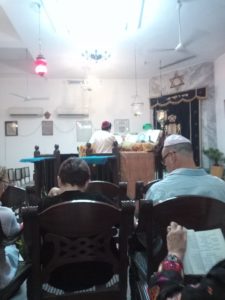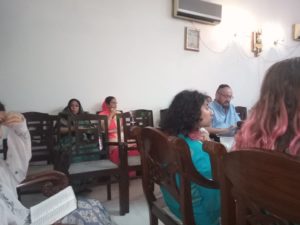Passover – Celebration of Freedom from bondage
The Pass Over is first of the three main festivals of the Jewish Year. It commemorates the Exodus from Egypt and is observed for 8 days from the evening of Wednesday, the 8th April, till 15th April, this year. The festival commemorates the deliverance of Jews from Egyptian bondage and becoming a free people awakened to the determination to serve none but the One God.

By Ezekiel Isaac Malekar
The word Pesach means, “Pass Over” and refers to the account in Exodus Chapter 12, that when the Angel of Death killed the first born of the Egyptians, he “passed over” the houses of the Israelites, which had all been carefully marked with a sprinkling of lamb blood on the door of posts. Another name of the festival is “Chag Hammatzoth” – the feast of the Unleavened Bread – grows out of the Biblical narrative of the manner in which the Jews were driven in haste out of Egypt carried with them dough still unleavened. As a yearly rememberance of this emergency, the Jews were commanded to eat only unleavened bread for entire eight days. The Pass Over is also known as “Hag- Ha-Aviv” the Festival of Spring.
The Pass Over is first of the three main festivals of the Jewish Year. It commemorates the Exodus from Egypt and is observed for 8 days from the evening of Wednesday, the 8th April, 2020 till 15th April, 2020. The first two days and last two days being sanctified days and the intervening four days, semi-holy. The Pass Over Festival commemorates the deliverance of Jews from Egyptian bondage and becoming a free people awakened to the determination to serve none but the One God.
 The historic events and ancient rituals are recounted during the Pass Over dinner called Pass Over Seder. Prayer Book Haggadah is read and all Jews remember that in every generation it is one’s duty to regard himself as if he personally had come out of Egypt. The Seder Service for the night of Pass Over is probably the let of all rituals of the sort at present current among mankind. The most ancient portions of the text are at least two thousand five hundred years old. It is the eternal message of hope that save the Jews from despair even in the darkest hours. It again resolves itself to the impressive statement: ” Thou art the man upon thee everything depends. Thou can create the world and thou can destroy it.”
The historic events and ancient rituals are recounted during the Pass Over dinner called Pass Over Seder. Prayer Book Haggadah is read and all Jews remember that in every generation it is one’s duty to regard himself as if he personally had come out of Egypt. The Seder Service for the night of Pass Over is probably the let of all rituals of the sort at present current among mankind. The most ancient portions of the text are at least two thousand five hundred years old. It is the eternal message of hope that save the Jews from despair even in the darkest hours. It again resolves itself to the impressive statement: ” Thou art the man upon thee everything depends. Thou can create the world and thou can destroy it.”
A famine ravished Canaan when Jacob and his family sought refuge on the east bank of the Nile. His descendants grew into a large nation; most of them lived in the Goshen region of Egypt. As time passed, their situation steadily deteriorated and ultimately they became mere slaves of the pharaohs. They suffered for 210 years. At last Moses and Aaron were sent to the royal court with the divine message : “Shallah eth ammiveyavduni” – Let My people go, that they may serve Me. The Pharaoh refused to pay heed and brought upon himself and his people the consequent onslaught of the 10 plagues. Later, when the Hebrew slaves were freed they went out of Egypt.
The Seder service is one of the most colourful and joyous occasions in Jewish life. The entire family gathers around the Seder table, on which are placed the traditional ceremonial objects. The Pass Over Seder service opens with chanting of the Kiddush (sanctification) followed by the drinking of the first cup of kosher wine. The master of the house breaks the middle of the three Matzoth, part of which called Aphikomon, he hides to be discovered at the conclusion of the meal. The matzot (unleavened bread) which give Pass Over the name Haq Hamtzot – the Feast of Unleavened bread is eaten in memory of the bread of affliction prepared by the Israelites during their hasty flight from Egypt. As he lifts the Matzah he recites, “This is the bread of affliction.” The youngest person present usually a child asks the four questions. 1. Why on this night, do we eat only unleavened bread?” 2. Why do we eat Marror? (Bitter herbs) 3. Why do we eat Charoseth? ( compound formed of nuts, fruits and wine) and 4. Why do we observe the ceremony of Seder?. The leader answers these questions by relating the story of Israel in Egypt and of the Exodus conducted by Prophet Moses. The bitter herbs which Jews eat is to recall that the Egyptians embittered the lives of our forefathers in Egypt as it is written, “And they embittered their lives with hard labour, with mortar and bricks, with every kind of work in the fields, all the work which they made them to do was rigorous. The Hallel (Psalms 113-114) is then sung and the fourth cup of wine taken.
 During the Seder, the spiritual presence of Prophet Eliyahahu Hanavi, the forerunner of the Mashiah, is felt in the house.The Seder has survived in the Jewish home through every exigency of history. Practised in secret by the Maranos in the days of the Inquisition, celebrated in the teeth of relentless mobs which the threats of the old “blood accusation”, the Seder persists as an emblem and promise of freedom. It ever was and still is the high spot of religious ceremonies.
During the Seder, the spiritual presence of Prophet Eliyahahu Hanavi, the forerunner of the Mashiah, is felt in the house.The Seder has survived in the Jewish home through every exigency of history. Practised in secret by the Maranos in the days of the Inquisition, celebrated in the teeth of relentless mobs which the threats of the old “blood accusation”, the Seder persists as an emblem and promise of freedom. It ever was and still is the high spot of religious ceremonies.
Hide original message
Pesach is initiated by a service in the synagogue, followed by the home Seder that literally means Order, a special meal with accompanying ritual commemorative of the exodus from Egypt. During the Seder the tale of Pass Over is read.The ceremonial meal begins with the chanting of sanctification prayer. After washing hands the participants take the leaf of parsley or watercress which symbolizes growth and dip it into salt water, recite prayers and eat it. The salt water is reminder of the tears shed by the enslaved Jews. On the Seder plate, the following too are seen: the roasted shank bone of a lamb symbolizing paschal lamb, a roasted egg symbolizing the holiday sacrifice, horse radish symbolizing the bitterness of slavery and a mixture of apples, raisins, cinnamon and wine that symbolizes the clay of Egypt with which the Jews were forced to make bricks.
(The author is Priest and Hony. Secretary, Judah Hyam Hall Synagogue, NewDelhi and member, National Minorities’ Council of India)